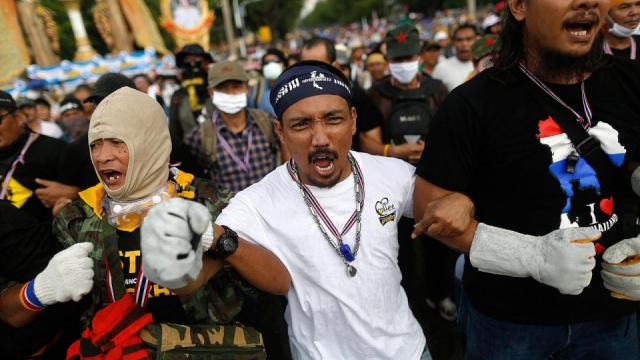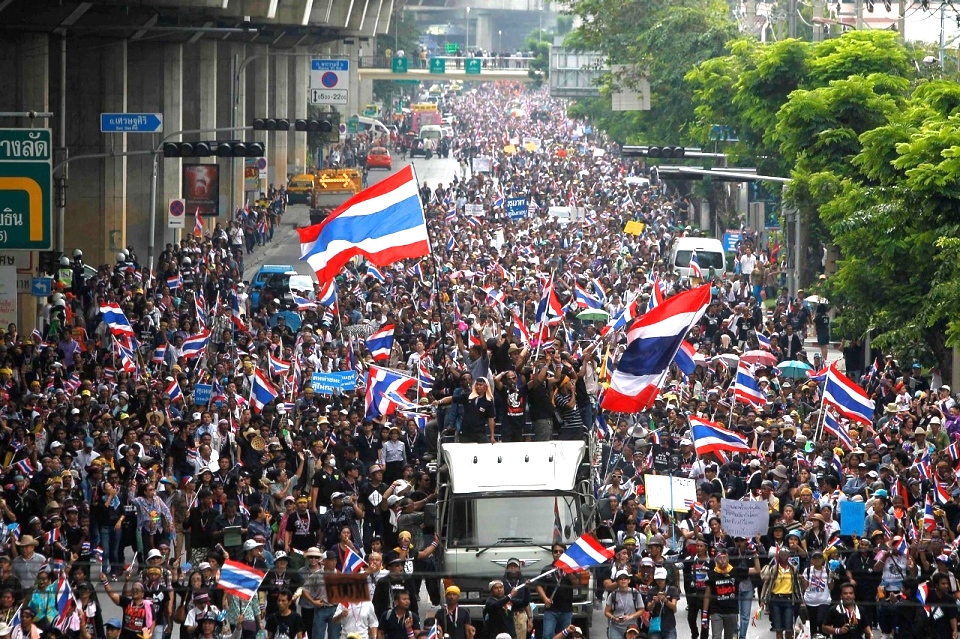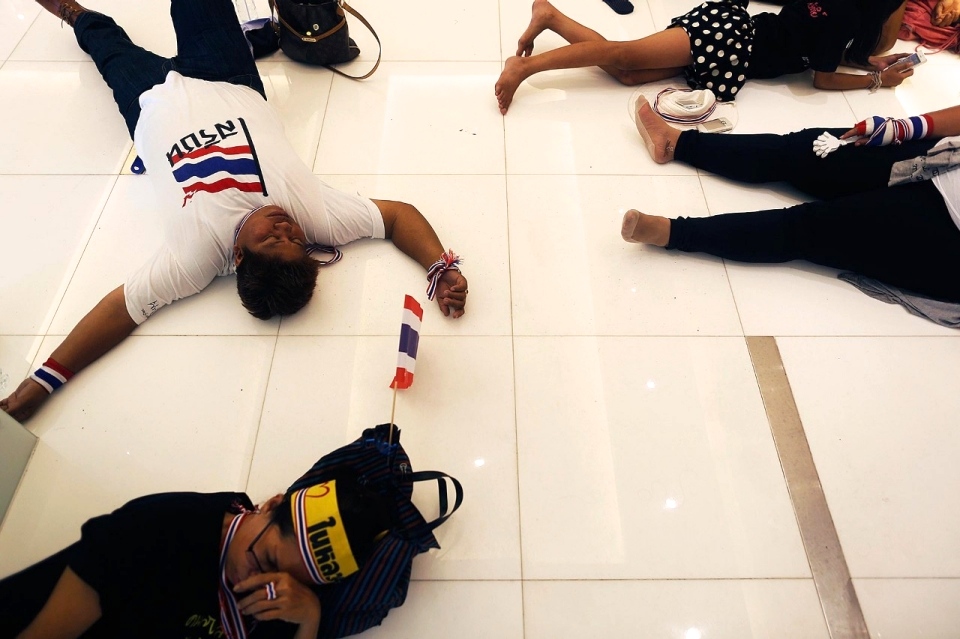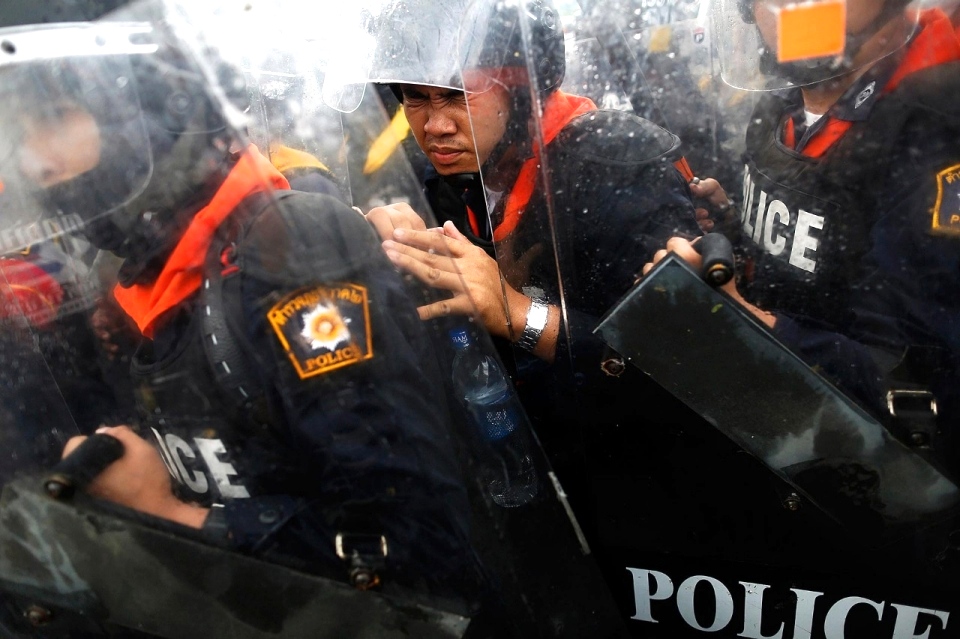
Thailand's Prime Minister Yingluck Shinawatra has invoked an emergency law after demonstrators seeking to remove her from office occupied parts of the Finance and Foreign ministries.
Yingluck announced on Monday that the Internal Security Act would cover all of Bangkok and the surrounding areas. Three especially sensitive districts of the capital have been under the law since August, when there were early signs of political unrest.
The law authorizes officials to seal off roads, take action against security threats, impose curfews and bar the use of electronic devices in designated areas. Peaceful rallies are allowed under the law.
Anti-government demonstrators occupied parts of the two ministry buildings, escalating protests that started over the weekend and drew over 150,000 people. They are calling for Yingluck to step down amid claims that her government is controlled by her brother, former Prime Minister Thaksin Shinawatra, who was ousted in a military coup in 2006.
The incursions into the ministry buildings were the boldest acts yet in opposition-led protests that started last month. They highlighted the movement's new strategy of paralyzing the government by forcing civil servants to stop working.
Protest leader Suthep Thaugsuban led the crowd at a rally at the Finance Ministry. Other protests snarled traffic across Bangkok.
"Go up to every floor, go into every room, but do not destroy anything," Suthep told the crowd before he entered the ministry and held a meeting in its conference room.
"Make them see this is people's power," said Suthep, a former deputy prime minister and an opposition lawmaker.
Protesters sang, danced and blew whistles in the hallways as part of the so-called whistle-blowing campaign against the government. One group cut power at the Budget Bureau to pressure the agency to stop funding government projects.
Police made no immediate move to oust them.
More than two dozen Bangkok schools along the protest route were closed Monday, and police tightened security at the protest destinations, which included the military and police headquarters and the five television stations controlled by the military or the government.
This is the largest of recent protests, which have been going on for a month. They were triggered by a controversial political amnesty bill that could have seen Thaksin's return from exile.
Although that bill has been shelved, protesters continue to rally against a government they claim is little more than a proxy for Thaksin.
"Tomorrow we will seize all ministries to show to the Thaksin system that they have no legitimacy to run the country," Suthep said, addressing a crowd.
Yingluck said Monday the occupation of the Finance Ministry could hurt investor confidence and undermine tourism. But the protests show no sign of slowing down.
"We have actions planned until Friday, and Thailand will not be the same after this," Jakkapun Kaewsangthong, a journalist taking part in the protests, told Al Jazeera.
"Power must be heavily divided and checked. Just as important as divided government is limited government ... Limiting government creates confidence in investment and freedom and jobs and economic prosperity to follow." Rival protest groups
Monday's rally came a day after about 150,000 people marched in Bangkok, the largest protest Thailand had seen in years.
There were no reports of clashes early on Monday, but many fear that violence could erupt between the anti-government protesters and about 40,000 of Thaksin's supporters, who are staging their own rally at a Bangkok stadium and have vowed to stay put until the opposition calls off its demonstrations.
Thaksin's supporters and opponents have battled for power since the 2006 coup, which followed street protests accusing him of corruption and disrespect for the country's constitutional monarch, King Bhumibol Adulyadej.
About 90 people were killed in 2010 when Thaksin's Red Shirt supporters occupied parts of central Bangkok for weeks before the government, led then by the current opposition, sent the military to crack down.
Thaksin has lived in self-imposed exile for the past five years to avoid a prison sentence for corruption. Yingluck's administration has struggled to contain the demonstrations.
The Senate rejected the amnesty bill earlier this month in a bid to end the protests. But they have gained momentum, and its leaders have shifted their target to the wider goal of toppling they call the Thaksin regime.
3 WAYS TO SHOW YOUR SUPPORT
- Log in to post comments














